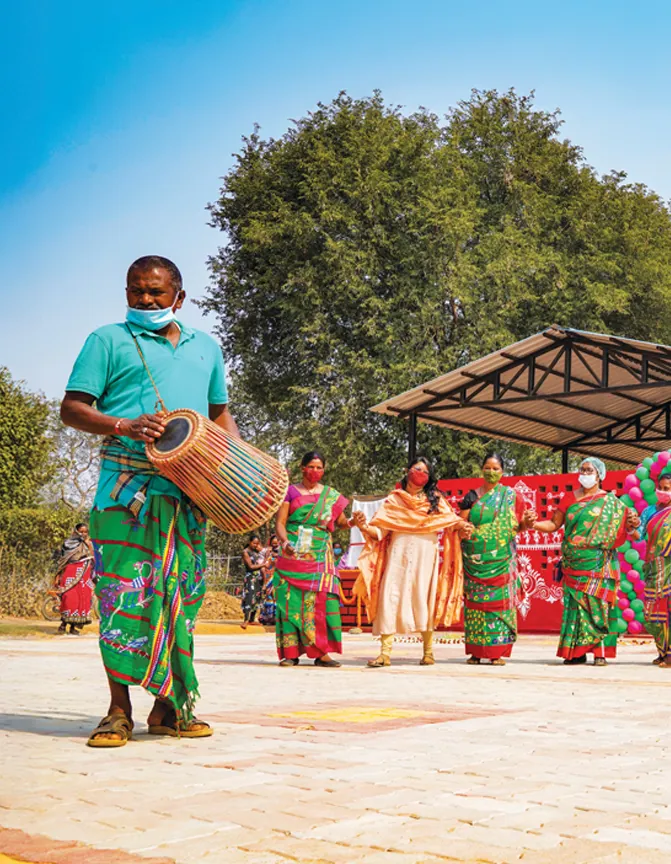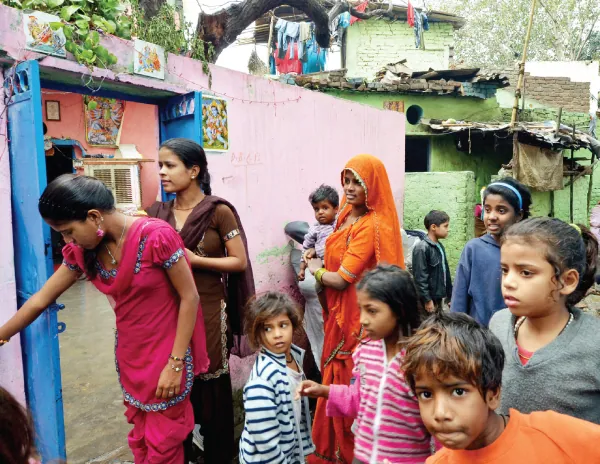
Home comforts
A study on policymaking and its outcomes highlights the critical role secure housing plays in easing the lives of underprivileged women in India’s cities
Empowering women is the key to building the future we want — I am often reminded of this when I interact with women who have carved out little havens of security and opportunity within some of the most unhygienic and crowded settlements in our burgeoning urban centres. Despite their daily struggles, given the platform and agency, these women will come together to build homes, manage community service and demand basic amenities.
India ranks 108 out of 193 countries in the United Nations Development Programme’s Gender Inequality Index. A safe and secure home with access to water, sanitation and hygiene is critical in ensuring the health and overall well-being of women, who are disproportionately affected by inadequate infrastructure, climate-related events and limited mobility. These factors hinder their ability to access resources and participate in public life.
Be it with land, housing or basic services, women are largely constrained by deficient schemes and policies, and by deeply ingrained patriarchal practices. Gender-specific needs are often neglected in Indian cities, leading to insecure and poorly designed civic facilities. Women are the worst affected by all of this.

In academic and policy-oriented research, tenure security and housing rights have been highlighted as aspects that are important for women in meeting their economic needs as well as in reducing poverty levels (Grown, et al, 2005). These also increase their participation in household decision-making (Swaminathan, Rahul, and Suchitra, 2012), protect them from domestic violence (Panda and Agarwal, 2005), and support their economic prosperity.
The policy landscape in India is undergoing a transformation, both at the Centre and in the states, by becoming increasingly supportive of women’s economic empowerment and social status. Notable here is the Pradhan Mantri Awas Yojana (PMAY), which encourages home ownership for women, making it mandatory for a household to have at least one female member registered as the owner of a new house. Recent initiatives have built on this favourable policy environment to increase women’s access to housing and basic amenities.
A widening of disparities
The need for gender-sensitive programming assumes increased significance as rapid, unplanned urbanisation, coupled with climate change, threatens to widen disparities. It is expected that India will have the highest number of vulnerable groups — primarily women and children — as climate change continues to become an ever-greater threat.
In the circumstances, the Tata Trusts felt the need to create a body of knowledge on policies and programmes that have impacted the access of women to housing, tenure and basic services, and to identify best practices. The learnings from the study will be used to inform programmes developed within the ‘urban poverty alleviation’ theme of the Trusts.
‘Women at Centre Stage — Tenure, Housing and Basic Services from a Gender Lens’ has been crafted by the India Resources Trust with support from the Trusts. It examines how urban habitat policies and legislations work on the ground, while providing valuable insights into their effect and efficacy. Additionally, three programmes involving government and civil society organisations — showcasing replicable good practices and innovations — have been analysed in detail.

Shikha Srivastava heads the urban poverty alleviation portfolio at the Tata Trusts
Women-led progress
From Kerala there’s Kudumbashree, one of the largest networks of women in the world. This organisation, comprising women-led groups at the neighbourhood, cluster and zonal levels, has enabled the rolling out of the ‘housing for all’ mission through surveys, field verifications and the active involvement of community networks. More than 130,000 beneficiaries have availed the scheme, promoting women’s home ownership across Kerala.
The study found that direct beneficiary transfers into women’s single or joint accounts ensured that funds were effectively used for house construction. Access to housing entitlements facilitated women’s limited engagement with formal financial institutions for housing loans, although challenges persist with stringent bank criteria.
Women respondents were found to be well-informed about PMAY’s beneficiary-led construction model, with most of them receiving assistance from Kudumbashree. Women who had moved into independent homes from joint family setups spoke about having more privacy and the freedom to make their own decisions.
Kudumbashree also provides short-term rental accommodation for women through She Lodge, a facility launched by the Kochi Municipal Corporation in March 2023 for working women and students travelling to the city. She Lodge includes rooms, dormitories, a library and a reading room. In nine months of functioning, it has served 22,000-plus women and earned a profit of ₹2.4 million. This is an initiative that can be replicated in other cities.
The second programme selected by the study was the Jaga Mission in Odisha, which seeks to provide tenure and liveable habitats to dwellers of informal settlements across the state. Land rights have been provided to around 150,000 residents thus far and 1,251 slums have been upgraded. The Tata Trusts were the lead partner (till 2021) in this project, which has won national and international recognition.
A crucial aspect of the land-titling programme was the ownership (or joint ownership) granted to the woman of the household. That in the bag, the Jaga Mission has moved from tenure to issues such as water, sanitation, open spaces, roads, waste management, energy and livelihoods.
Women respondents benefitting from the Mission’s programme said secure tenures improved their safety and security, eliminated the fear of eviction and reduced domestic violence. They added that they were now able to focus on the health and education of their children.
Access to basic services has significantly improved women’s quality of life through in-situ slum upgrades. The realisation of policy intent was noted on the ground as most women received ‘land rights certificates’ (LRCs) in their names.
Kutcha (makeshift) houses, though, are still the norm, even after tenure has been secured, which results in greater losses when extreme weather events occur. However, waterlogging, flooding and water stress at the neighbourhood level have been reduced through infrastructure upgrades.
Penetration of formal credit has been painfully slow and, currently, LCRs are not recognised as valid collateral by banks. This hinders access to formal credit for people in dire need of exactly that.

The last initiative to be studied was the work done by Mahila Housing Trust (MHT) in Jodhpur (Rajasthan) through its women-led ‘community action groups’ (CAGs), which have enabled improved access to housing assistance and basic services.
MHT has facilitated microloans for women and provided technical assistance to generate construction estimates and house designs. The implementation of cool roofing, for instance, has lowered indoor temperatures. Women have been able to build structurally sound houses and — with tenure security in place — incrementally upgrade them.
More than one-third of the women surveyed were able to avail loans to construct or upgrade their homes. CAGs at the neighbourhood level have enhanced access to basic services such as water, sanitation, and electricity by empowering women to voice concerns, engage with officials and secure housing subsidies and loans.
The commonality for the women, regardless of where they hailed from, was household security and improved access to government schemes. Also, women who have sole ownership (or are the primary holders of LCRs) have greater decision-making power in their homes.
The study found that, overall, despite gains in tenure security and housing stability, challenges persist, principally poor infrastructure and the limited representation of women in urban planning. Patriarchal norms often restrict women’s legal rights to land and inheritance, hampering their ability to fully benefit from housing programmes.
The necessity is to design schemes that prioritise women’s names as primary house owners, ensuring their inclusion in utility bills and official documents, as well as offering gender-based incentives to promote land ownership. This needs to be supported by legal, social and institutional mechanisms that help women access formal credit.
The need for doing these cannot be stressed enough, because empowering women is the key to building the future we want.